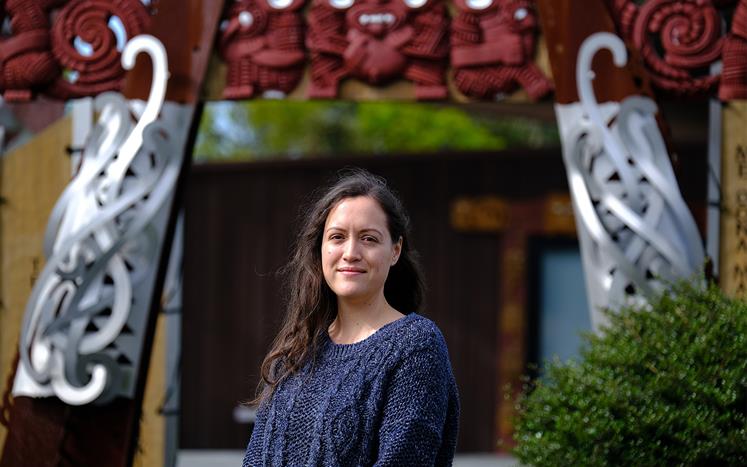Indigenous designer revitalises Māori design through community collaboration

Jade Kake, Indigenous designer of Matakohe Architecture + Urbanism, dreams of an Aotearoa where design is always in collaboration with hapū and iwi. Photo: Geoff Ridder.
Indigenous designer Jade Kake of Whangārei, treated Hamilton audiences with a kōrero (talk) recently as part of the School of Media Arts’ Ramp Talks at Te Kōpū Mānia o Kirikiriroa Marae, Wintec.
Although Kake was raised in Australia, she always had a strong anchoring to home. She grew up living communally and her father designed and built their whānau home.
“I didn’t grow up wanting to be a designer, but I guess you could say there’s been a logic to how I’ve ended up here.”
Although she never knew she’d end up in this career, Kake was always a dreamer. Now she is a visionary and a future-shaper. She is also incredibly humble. As the founder of and driving force behind Matakohe Architecture + Urbanism, Kake’s community-based approach to the work she does is evidence of a person who truly believes that change can happen through listening to the needs of people who have historically been ignored and actively silenced.
Rather than let that history cripple her, it fuels Kake’s fire and the impact she is having on her own hapū (sub-tribe), and the hapū of others is already creating big changes in those communities.
The work Matakohe Architecture + Urbanism do is varied but ranges from architecturally designed papakāinga (traditional Māori communal/community living) to working with local councils and mana whenua (people of the hapū) groups in co-designing civic and commercial spaces.
“We support Māori communities and organisations to progress marae, papakāinga and whenua development projects by combining cultural and technical expertise to co-create a design process that takes into consideration the history, culture and aspirations of the community,” says Kake.
During the talk, Kake discussed in detail some of the projects that her and her team of Indigenous wāhine (women) have been working on.
The project that excites Kake the most though is also her ‘dream project’ - the revitalisation and design of a papakāinga for her own hapū in Whangārei.
“It’s been a long process - over ten years, but we’ve been working together with our whānau whānui (wider family) and we’ve come up with an exciting design.”
“The ‘marae’ itself is a new typology. Villages disappeared after colonisation and gave way to the contemporary marae. The marae as we know it is at the heart of the kāinga. Everything should be enhancing the marae.
“It’s my dream that in these new papakāinga our language can thrive. It’s an opportunity to enrich te reo and to learn.”
Kake’s contemporary papakāinga designs are resilient models that include income streams for sustainability such as public campgrounds and light industrial parks.
There are many differences between Kake’s approach to a non-Indigenous design approach, but the key to Kake’s method is honouring and listening to mana whenua.
“Hapū-rangatiratanga [loosely – self-determination at a hapū level] is at the core of these projects. Those with close whakapapa [lineage] to the community should be at the heart. It’s about strengthening the capacity of the hapū through these relationships and opportunities. If I can assist and grow that talent pool, then I’m happy to help.”
With such a specialised skill, Kake and her design team are in high demand as councils in many urban centres are beginning to understand the importance of architectural design that’s informed by the “history, culture and aspirations of the community.”
Kake sees her role in situations where she’s not mana whenua as a facilitator and grower of opportunities.
“If I’m asked by a group or council that needs my help where I’m not mana whenua I’ll firstly recommend an architect who is, and say, “you could work with them or we could all work together”.
“It’s important to grow the talent pool and strengthen the capacity of the hapū, so as much as possible I’ll include tauira [students] and emerging practitioners in assisting with the project.”
The kaupapa of collaboration that informs Kake’s work resonated with Megan Lyon, Ramp Festival Director involved in the Ramp Talk series, who felt that Kake was the right person to deliver a talk that engages with contemporary issues affecting Māori in a constructive and considered way.
“Our Ramp events kaupapa is all about furthering creative connections and offering fresh insights by bringing students, community and industry together.
“Jade spoke of the ideas of home, whānau and community, which is timely and relevant when there is a heightened awareness of these themes as a result of lockdown and the global pandemic.
"Particularly for our students these talks get them thinking about new perspectives which they can consider when studying for their own creative careers.”
Wintec’s Executive Director Māori Hera White, who is on the Habitat for Humanity board with Kake, echoes Lyon’s words, affirming the importance of connecting with students who want to make proactive contributions to their communities.
“Jade is a brilliant young woman who is a leader in revitalising Māori architecture and design which is her profession. However her main passion and driver is self-determination of whānau and hapū, and building capability within them.”
What is a papakāinga?
Papakāinga isn’t a word that can be simplified into English easily, but it’s a contemporary model based on how Māori lived prior to colonisation. It varies in design but can be pictured as a community living situation with homes for whānau all centred around a marae or other communal living facilities. Papakāinga was the norm prior to colonisation and urbanisation and is currently being revitalised across Aotearoa.
Definitions vary, but the term papakāinga is generally reserved for communities located on ancestral land and occupied by people with shared whakapapa. This also means decisions about the land and housing are a shared responsibility under a recognised governance structure.
Read more:


